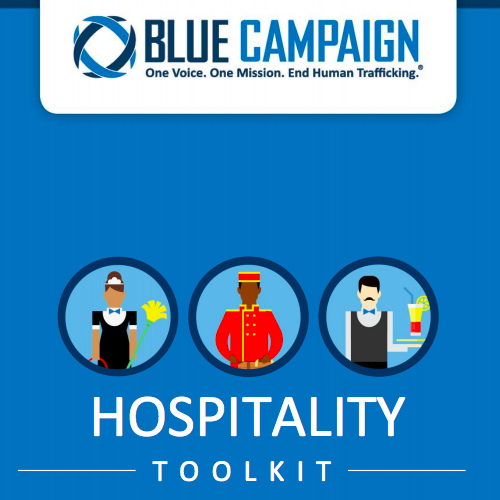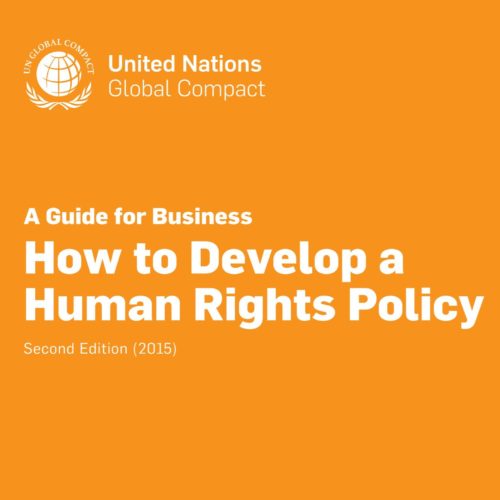-
 The GLAA (formerly GLA) is a non-departmental public body in the United Kingdom regulating the supply of workers to the agricultural, horticultural and shellfish industries, and any associated processing and packaging industries. It has been granted police-style powers to investigate labour abuse and exploitation across all aspects of the UK labour market. Specific public authorities now have a duty to notify the Secretary of State of any person in England and Wales suspected of being a victim of human trafficking. This 10 minute video is an excellent resource for demonstrating the methods traffickers use to entrap and exploit people through modern slavery. Credit: Gangmasters and Labour Abuse Authority
The GLAA (formerly GLA) is a non-departmental public body in the United Kingdom regulating the supply of workers to the agricultural, horticultural and shellfish industries, and any associated processing and packaging industries. It has been granted police-style powers to investigate labour abuse and exploitation across all aspects of the UK labour market. Specific public authorities now have a duty to notify the Secretary of State of any person in England and Wales suspected of being a victim of human trafficking. This 10 minute video is an excellent resource for demonstrating the methods traffickers use to entrap and exploit people through modern slavery. Credit: Gangmasters and Labour Abuse Authority -
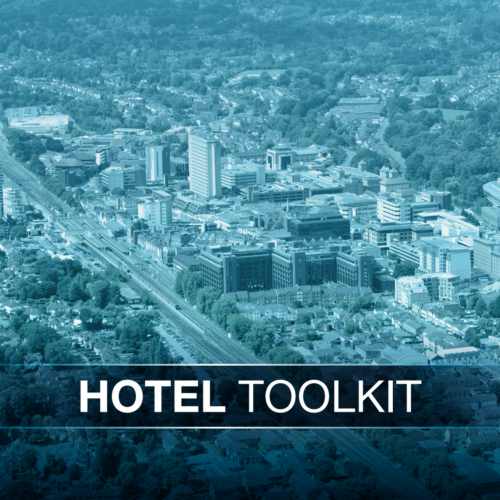 This toolkit was created by Surrey Police and is intended to provide staff working in the hotel industry with supporting information on how to act if they should encounter a human trafficking situation. The first section focuses on Operation Makesafe, which focuses on identifying victims of child sexual exploitation. The second section details action to take on encountering a potential victim.
This toolkit was created by Surrey Police and is intended to provide staff working in the hotel industry with supporting information on how to act if they should encounter a human trafficking situation. The first section focuses on Operation Makesafe, which focuses on identifying victims of child sexual exploitation. The second section details action to take on encountering a potential victim.Credit: Surrey Police
-
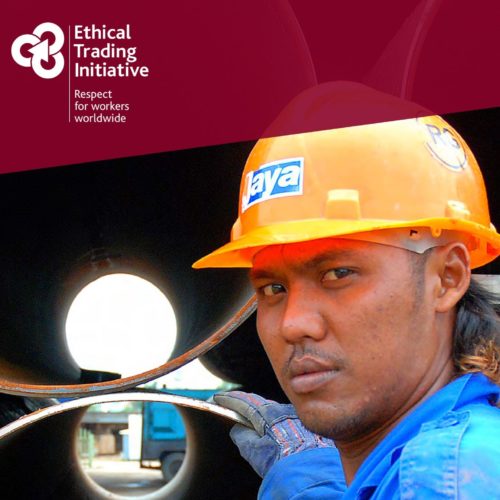 The Ethical Trading Initiative (ETI) is an alliance of companies, trade unions and NGOs that promotes workers' rights around the world. This guide is for companies to help them prevent and manage labour rights risks, and understand why engagement, negotiation and collaboration is key.
The Ethical Trading Initiative (ETI) is an alliance of companies, trade unions and NGOs that promotes workers' rights around the world. This guide is for companies to help them prevent and manage labour rights risks, and understand why engagement, negotiation and collaboration is key.Credit: Ethical Trading Initiative
-
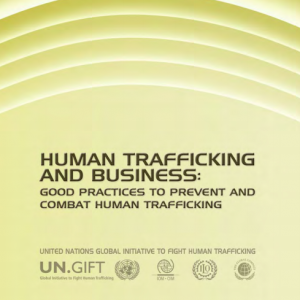 This report presents an introduction and overview of human trafficking and the role that business can play in addressing it. It draws from key case studies to illustrate some of the many ways employers can practically address human trafficking.
This report presents an introduction and overview of human trafficking and the role that business can play in addressing it. It draws from key case studies to illustrate some of the many ways employers can practically address human trafficking.Credit: UN Global Initiative to Fight Human Trafficking
-
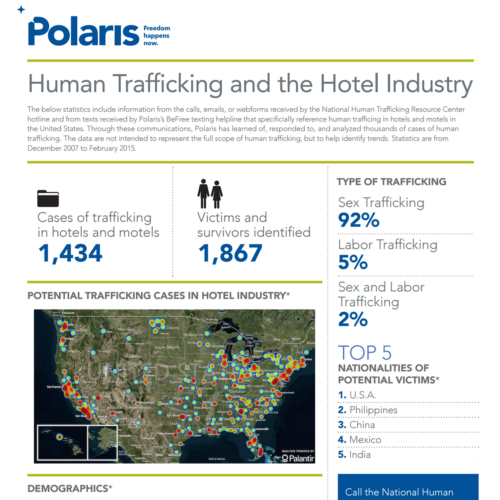 This infographic factsheet from Polaris has been put together using statistics from the National Human Trafficking Resource Centre hotline and texts from the Polaris BeFree texting helpline. It specifically references human trafficking in hotels and motels in the US. The data is used to identify trends in cases and indicators of sex and labour trafficking in hotels, and the factsheet provides recommendations for the hotel industry.
This infographic factsheet from Polaris has been put together using statistics from the National Human Trafficking Resource Centre hotline and texts from the Polaris BeFree texting helpline. It specifically references human trafficking in hotels and motels in the US. The data is used to identify trends in cases and indicators of sex and labour trafficking in hotels, and the factsheet provides recommendations for the hotel industry.Credit: Polaris Project
-
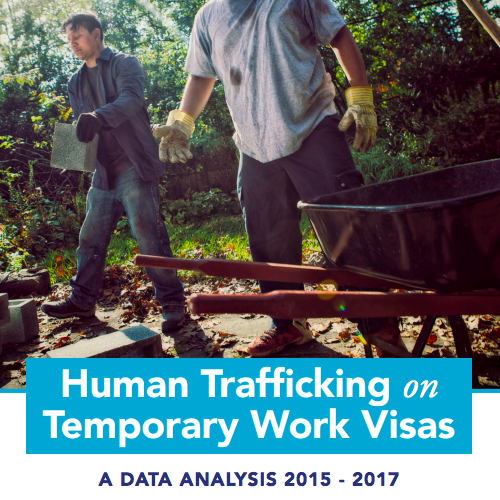 This report highlights the destructive practice of labour trafficking on temporary work visas, how the system is flawed, and the steps needed to fix it. From 2015-2017, Polaris collected data on the US temporary work visa system and identified some 800 victims of human trafficking who held temporary work visas at the time of their abuse.
This report highlights the destructive practice of labour trafficking on temporary work visas, how the system is flawed, and the steps needed to fix it. From 2015-2017, Polaris collected data on the US temporary work visa system and identified some 800 victims of human trafficking who held temporary work visas at the time of their abuse.Credit: Polaris
-
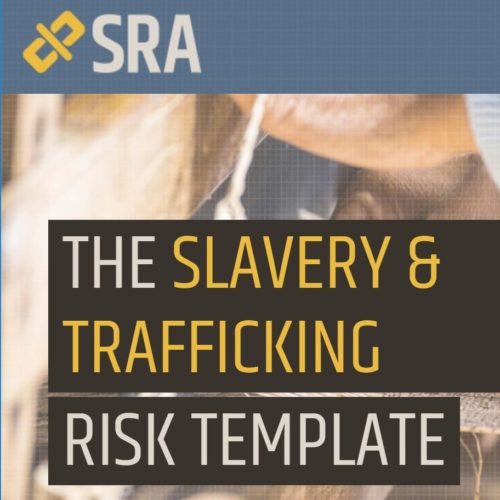 The Slavery and Human Trafficking Risk Template (STRT) is a free, open-source data collection template that forms the backbone of corporate modern slavery due diligence programs. It is maintained by a Development Committee committed to ensuring it keeps stride with new research and evolving industry needs. It is housed under the Social Responsibility Alliance, an initiative dedicated to providing companies with the open-source data collection tools they need to build socially responsible supply chains.
The Slavery and Human Trafficking Risk Template (STRT) is a free, open-source data collection template that forms the backbone of corporate modern slavery due diligence programs. It is maintained by a Development Committee committed to ensuring it keeps stride with new research and evolving industry needs. It is housed under the Social Responsibility Alliance, an initiative dedicated to providing companies with the open-source data collection tools they need to build socially responsible supply chains.Credit: Social Responsibility Alliance
-
 The ITP engages with the world's leading hotel companies to drive responsible business in the hotel industry. They offer best practice, practical tools and programmes to facilitate collaboration. This guide was developed to help hoteliers understand human trafficking, the risk of the issue affecting them and their business, and what they can do to combat the problem.
The ITP engages with the world's leading hotel companies to drive responsible business in the hotel industry. They offer best practice, practical tools and programmes to facilitate collaboration. This guide was developed to help hoteliers understand human trafficking, the risk of the issue affecting them and their business, and what they can do to combat the problem.Credit: International Tourism Partnership (ITP)
-
 Stronger Together is a multi-stakeholder initiative which aims to reduce modern slavery. It provides guidance, training and resources to organisations, employers, labour providers, workers and their representatives. This free collection of resources includes pragmatic guidance and toolkits, and resources for the workplace including multilingual posters, leaflets and template policies. This guidance is intended for tenants renting home privately in the UK. It includes both obligations of the landlord and of tenants, and provides contact and advice helplines.
Stronger Together is a multi-stakeholder initiative which aims to reduce modern slavery. It provides guidance, training and resources to organisations, employers, labour providers, workers and their representatives. This free collection of resources includes pragmatic guidance and toolkits, and resources for the workplace including multilingual posters, leaflets and template policies. This guidance is intended for tenants renting home privately in the UK. It includes both obligations of the landlord and of tenants, and provides contact and advice helplines.Credit: Stronger Together
-
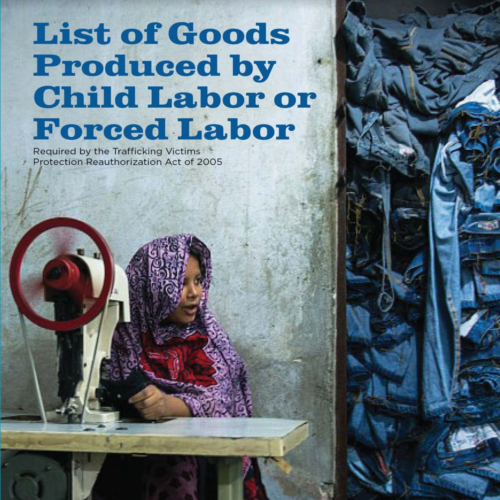 The US Department of Labor maintains a list of goods and their source countries which it believes likely to have been produced by child labour or forced labour in violation of international standards. It is not an exhaustive list and is primarily intended to raise public awareness, but is a useful starting point for considering the origins of any products bought for use by and within the hotel.
The US Department of Labor maintains a list of goods and their source countries which it believes likely to have been produced by child labour or forced labour in violation of international standards. It is not an exhaustive list and is primarily intended to raise public awareness, but is a useful starting point for considering the origins of any products bought for use by and within the hotel.Credit: US Government
-
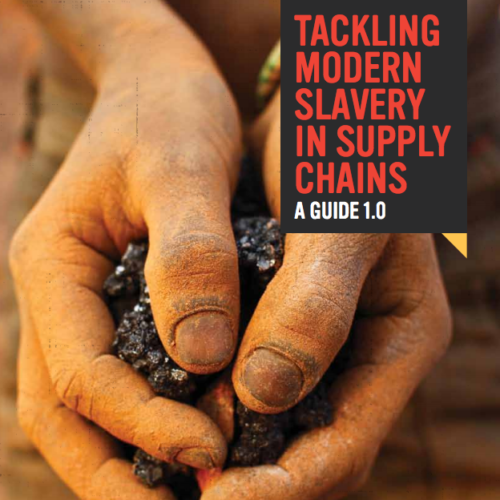 The Walk Free Foundation was established by Andrew Forrest, the Chairman of Fortescue Metals Group, after he found labour exploitation within his own supply chains and took a number of steps to prevent modern slavery affecting his business. This comprehensive guide considers corporate policy on modern slavery and provides both guidance and tools to implement it. It includes advice on corporate policy and provides template examples of a number of tools.
The Walk Free Foundation was established by Andrew Forrest, the Chairman of Fortescue Metals Group, after he found labour exploitation within his own supply chains and took a number of steps to prevent modern slavery affecting his business. This comprehensive guide considers corporate policy on modern slavery and provides both guidance and tools to implement it. It includes advice on corporate policy and provides template examples of a number of tools.Credit: Walk Free Foundation & Verite
-
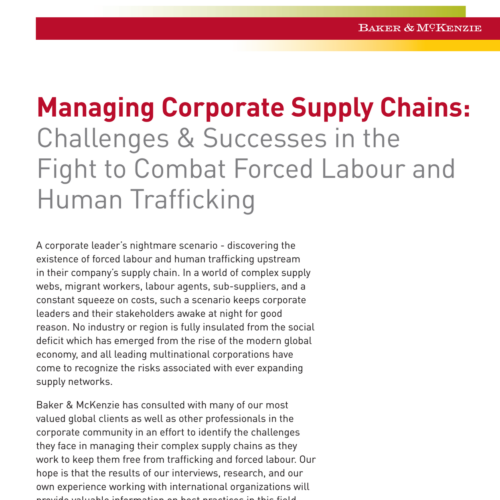 This guide is published by a law firm with expertise providing modern slavery related advice to business. It gives a good overview of the scope of the problem of trafficking in supply chains, and what existing support there is for business. It looks at the legal mechanisms already in place to protect against modern slavery in corporate supply chains, as well as the successes and challenges of corporate initiatives, and solutions to the problem.
This guide is published by a law firm with expertise providing modern slavery related advice to business. It gives a good overview of the scope of the problem of trafficking in supply chains, and what existing support there is for business. It looks at the legal mechanisms already in place to protect against modern slavery in corporate supply chains, as well as the successes and challenges of corporate initiatives, and solutions to the problem.Credit: Baker McKenzie
-
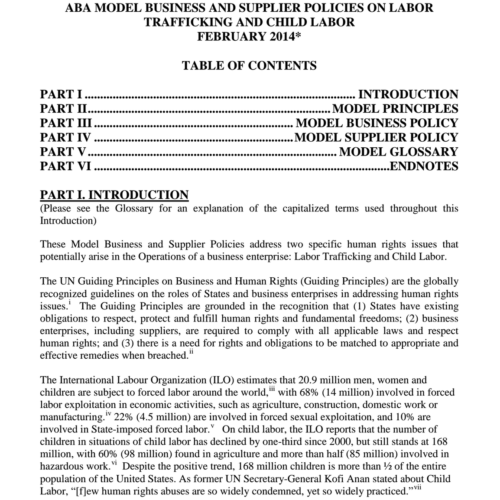 These model principles are intended for both businesses and suppliers that do not currently have policies relating to labour trafficking and child labour, and for those that do but want to adapt them to reflect evolving practices. Included are examples of model policies and principles that can be incoporated into codes of conduct or current business policies.
These model principles are intended for both businesses and suppliers that do not currently have policies relating to labour trafficking and child labour, and for those that do but want to adapt them to reflect evolving practices. Included are examples of model policies and principles that can be incoporated into codes of conduct or current business policies.Credit: American Bar Association
-
 Stronger Together is a multi-stakeholder initiative which aims to reduce modern slavery. It provides guidance, training and resources to organisations, employers, labour providers, workers and their representatives. This free collection of resources includes pragmatic guidance and toolkits, and resources for the workplace including multilingual posters, leaflets and template policies. These seven principles have been agreed upon by the supermarket businesses sponsored by Stronger Together. The list includes "common principles" for the businesses' supply chains partners to follow when completing modern slavery statements.
Stronger Together is a multi-stakeholder initiative which aims to reduce modern slavery. It provides guidance, training and resources to organisations, employers, labour providers, workers and their representatives. This free collection of resources includes pragmatic guidance and toolkits, and resources for the workplace including multilingual posters, leaflets and template policies. These seven principles have been agreed upon by the supermarket businesses sponsored by Stronger Together. The list includes "common principles" for the businesses' supply chains partners to follow when completing modern slavery statements.Credit: Stronger Together

